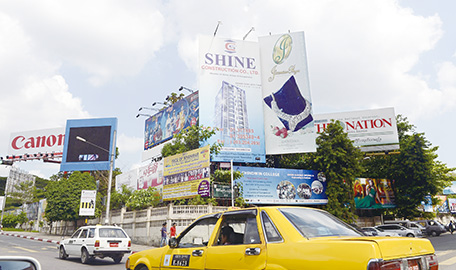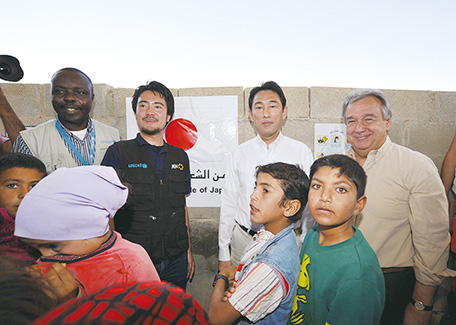Japan's Official Development Assistance White Paper 2013
Section 4 Operational Status of the Principle of Assistance Implementation
In line with the philosophy of the Official Development Assistance (ODA) Charter, the Japanese government provides ODA comprehensively taking into account developing countries’ needs for assistance, socio-economic conditions, and Japan’s bilateral relations with the recipient country, and in accordance with the principles of the United Nations (especially sovereign equality and non-intervention in domestic matters) as well as the following principles of ODA implementation.
1. Environmental conservation and development should be pursued in tandem.
2. Any use of ODA for military purposes or for aggravation of international conflicts should be avoided.
3. Full attention should be paid to trends in recipient countries’ military expenditures, their development and production of weapons of mass destruction and missiles, their export and import of arms, etc., so as to maintain and strengthen international peace and stability, including the prevention of terrorism and the proliferation of weapons of mass destruction, and from the viewpoint that developing countries should place appropriate priorities in the allocation of their resources on their own economic and social development.
4. Full attention should be paid to efforts for promoting democratization and the introduction of a market-oriented economy, and the situation regarding the protection of basic human rights and freedoms in the recipient country.
●Specific Operation
For specific operation of the principle of ODA implementation, it is vital that judgments are made not by mechanically applying a series of set standards, but by comprehensive evaluation on a case-by-case basis that considers the various conditions in the recipient country and other related circumstances. In addition, humanitarian considerations for the people of the developing country must be made as well. If ODA is suspended or reduced according to the principle of ODA implementation, it is the ordinary people of these recipient countries of ODA, in particular the impoverished people that have to suffer from the most serious impact. Accordingly, even in cases in which ODA is suspended or reduced, it is necessary to consider combining such judgment with measures that give special consideration to the implementation of emergency or humanitarian assistance.
●Consideration of the Environment and Society
In promoting economic development, consideration must be given to the burden on the environment and the impacts on the local communities. Japan has suffered numerous instances of industrial pollution, including Minamata disease. Japan utilizes these experiences to implement ODA carefully in order to avoid and minimize adverse impacts on the environment. Japan also gives consideration to ensuring that its development policies do not have undesirable impacts on local societies, in particular on the socially vulnerable such as the poor, women, ethnic minorities, and persons with disabilities. For example, JICA proclaimed the new “JICA guidelines for environmental and social considerations” in April 2010, based on which JICA ensures that the due consideration is given to environmental and social factors in its preliminary studies, environmental reviews, and monitoring at the implementation stage.
Also, Japan implements a policy of incorporating gender perspective at all stages of projects—including policy formulation, planning, implementation, and evaluation—in order to promote “gender mainstreaming in development.”
●Avoidance of Military Uses and of Encouragement of International Conflict
In order to avoid the use of Japan’s ODA in developing countries for military purposes or to encourage international conflict, Japan does not implement ODA directly to the military or military personnel in developing countries.
Japan proactively contributes to the fight against terrorism and peacebuilding, but in order to prevent aid supplies and funds provided by Japan from being used for military purposes, Japan ensures that sufficient attention is given to the principles of assistance implementation even when the ODA is provided for counter-terrorism measures.
●Response for Promoting Democratization and for Ensuring Basic Human Rights and Freedoms
The new government formed after political turmoil in developing countries might have doubts regarding their democratic legitimacy. In such situations, the constitutions might be suspended that should halt infringement of human rights, or the basic human rights of the people of such countries would be violated. There is also the possibility that the human rights of the people of the country would be threatened by government suppression in developing countries where anti-government demonstrations occur frequently. In such cases, Japan deals cautiously with implementing ODA assistance by ensuring that ODA is used appropriately and also conveying to the recipient country its deep concern regarding the status of democratization and human rights in developing countries.
Myanmar : In the past with regard to ODA to Myanmar, Japan had considered and implemented on a case-by-case basis projects centering on basic human needs (BHN) which would directly benefit the people of Myanmar while closely following the progress of democratization and improvement of human rights situations in Myanmar. However, from 2011, based on measures taken by the government of Myanmar including the release of political prisoners and the ceasefire with ethnic minority armed opposition groups, and as a result of the parliamentary by-election on April 1st 2012, the achievement of the political participation of a wide-range of concerned parties including Daw Aung San Suu Kyi and progress in economic reform such as the abolition of the multiple currency exchange system, Japan announced in the Japan-Myanmar Summit Meeting on April 21st its review of the economic cooperation policy towards Myanmar, and agreement regarding the course for clearing its arrears in a comprehensive way as a precondition for fully resuming Japan’s assistance.
In January 2013, Myanmar was able to clear its overdue debts to the World Bank, the Asian Development Bank (ADB), and Japan through the use of bridge loans provided for repayment and debt relief. Subsequently, ODA loans from Japan were resumed after a 26-year hiatus, and full-fledged assistance from the World Bank and ADB was also restarted after a 30-year gap. Under a new economic cooperation policy, in order to support Myanmar’s efforts for reforms in various areas towards its democratization, national reconciliation and sustainable economic development, Japan will extend economic cooperation focusing on the following areas, while continuously observing the progress of these efforts so that a wide range of people can enjoy the benefits from democratization, national reconciliation and economic reforms;
i. Improvement of people’s livelihood (including assistance for ethnic minorities and the poor as well as agricultural and rural development)
ii. Capacity building and institutions development to sustain the economy and society (including assistance for promotion of democratization)
iii. Development of infrastructure and related systems necessary for the sustainable economic development”
Based on this policy, Prime Minister Shinzo Abe, during his visit to Myanmar in May 2013, expressed that the public and private sectors of Japan would together extend full support for the efforts being made by the Government of Myanmar towards the reforms, and Japan’s intention to implement assistance totaling ¥91 billion (¥51 billion as ODA loans as well as ¥40 billion as grant aid and technical cooperation) to Myanmar in sequence by the end of the FY2013.
Japan has been also focusing on assistance to ethnic minorities in Myanmar, appointing Mr. Yohei Sasakawa, Chairman of the Nippon Foundation, who has been working for support in regions of Myanmar’s ethnic minorities, as Special Envoy of the Government of Japan for National Reconciliation in Myanmar.

A street full of billboards in Yangon City, Myanmar (Photo: Kyodo News)
Syria : Since March 2011, anti-government demonstrations have been taking place in various regions of Syria, and the country’s security authority suppresses demonstrators by force. Japan has strongly urged the Syrian regime to immediately stop acts of violence against civilians, and promptly implement various reforms that people are demanding, including political and economic ones to restore the stability of the country. From this standpoint, Japan has decided to withhold the implementation of new bilateral ODA, except for assistance in an emergency or in case of humanitarian need.
However, more than 2 million people have fled Syria to other countries, and the humanitarian situation in Syria and neighboring countries is worsening. Recognizing this humanitarian crisis as an urgent issue for the international community to address, Japan pledged $155 million in humanitarian assistance for refugees and displaced persons. In addition, in June 2013, as a part of assistance for the neighboring countries, Japan decided to provide an additional ODA loan worth $120 million to Jordan (as of September 27, 2013).
Moreover, due to the humanitarian concerns in the areas out of reach of the Syrian government and international organizations, Japan decided to implement humanitarian assistance in the health sector by coordinating and cooperating with local people in June 2013 such as the assistance units of the opposition groups and NGOs, and has been providing medical equipment. Japan will continue providing such assistance, including supports for the neighboring countries, in order to contribute to the stabilization of Syria and the entire Middle East region.

Minister for Foreign Affairs Fumio Kishida and Mr. António Guterres, United Nations High Commissioner for Refugees (UNHCR) visited a Syrian refugee camp in Zaatari to see the activities of JEN, a Japanese NGO (July 2013).
